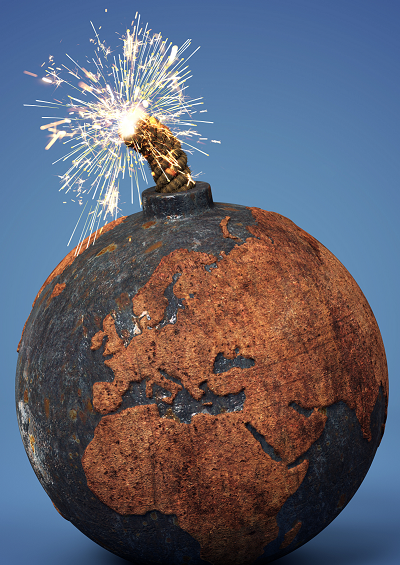Time to Ditch Rawls?
We now live in a world where liberal democracies, principally the United States, do not affirm the principles of liberalism.
August 6, 2016

The seminal work in political philosophy for the era of globalization is John Rawls’ “The law of peoples.” It was written in 1999.
Never a man of small ambitions, John Rawls turned his attention from how a single nation-state should be organized (the subject of his earlier work) to how the world should be organized.
Obviously, that task had to be done at a very abstract level and it reflected the situation Rawls (and the world) seemed to face in the 1990s. But the world has changed considerably over the past 20 years.
Is our world today still compatible with the abstract sketch of the world made by Rawls – and hence the recommendations Rawls drew from that sketch? Or have they become irrelevant because the world has changed too much?
Rawls describes five types of societies:
-
1. liberal
2. consultative hierarchical societies
3. “burdened” societies (prevented to be liberal because of their poverty)
4. outlaw states (notice: not societies) and
5. benevolent absolutisms.
The rules which Rawls established on the basis of that framework are relatively simple — and some would even say simplistic.
The well-ordered societies (the first two on the list), though different in their internal structure, can coexist at peace because they respect each other. And liberal societies do not try to impose their norms on consultative hierarchies. They also do not try to export democracy.
Liberalism vanished?
So, the Rawlsian sketch of the world is this: Liberal societies reaffirm their liberal principles daily, they live in peace with hierarchical societies, they do not export democracy, they help only the poorest countries and this very moderately (until they can be “well-ordered” or liberal), and, importantly, they do not allow economic migration.
The problem with Rawls’ taxonomy now
Whatever the merits of that argument at the time, we now live in a world where liberal democracies – principally the United States, the chief exhibit — do not affirm the principles of liberalism, as Rawls had expected, neither domestically nor internationally.
A United States where a third or more of the population is composed of “malcontents” willing to vote for a clearly illiberal candidate means that the belief in the principles of liberalism and affirming them in daily life (as Rawls insisted is crucial) has not taken a firm root. It is a failure of a society that was considered by Rawls to be a chief custodian of liberal values.
This failure added to the pervasive role of money in U.S. electoral politics, lower tax rates for capital than labor, neglect of public education etc. imply that the country is domestically very far from Rawls’ idea of liberalism.
A big change
The difference is so great that we cannot, I think, speak of a mere discrepancy any longer. The difference between the abstract idea and what exists in reality is too big. Such a society belongs to an entirely different category.
Moreover, in foreign policy, as became clear with the Iraq war, the United States has acted like an outlaw state. It has broken with the fundamental rule on which the international community is founded, namely absence of wars of aggression.
Thus, the trouble for Rawls and his famous framework is that the United States, the presumed “liberal” society par excellence, has turned non-liberal domestically and abroad. Worse, it exhibits a once unimaginable strong trend to act as an outlaw state.
No benign Middle East
The benign consultative hierarchies, his second category which Rawls had in mind probably in order to fit Middle Eastern Islamic societies in his scheme, are practically non-existent today.
The Middle East is either in total chaos or in the grip of absolutist dictatorships like Egypt, Saudi Arabia and the Gulf sheikdoms.
They are not well-ordered societies in Rawls’ terms. Thus neither of the top two categories that Rawls had in mind seems to have survived well.
There also is no place in his taxonomy for the multi-country non-state organizations like ISIS. A general theory that has no place for organizations that do not accept current state borders is clearly incomplete.
There is also no place for what is now called illiberal democracy, namely a society – like Russia and Turkey — that preserves many of the accoutrements of a liberal society (elections, political parties, NGOs), and yet where only one party or one leader ever wins elections and where the media and the judiciary are directly or indirectly controlled.
Migrations, driven by economic reasons and thus by global inequality, also do not have a place in Rawls’ framework. But they do exist in real life.
Economic migrants from Africa and Asia into Europe or Mexico and Central America into the United States number millions. But the theory that says that this should not happen is of no use when these things do happen.
Time to revise Rawls?
Finally, Rawls grossly underrated the importance that people attach to income and wealth for their happiness. Importance of pecuniary incentives has only increased with globalization since income differences have become more visible.
The changes over the past two decades have been, I believe, so remarkable that the typology offered by Rawls has lost its relevance.
But if the typology does not fit reality, then the recommended relations between the different societies, based on this typology, do not have any relevance either.
This is why I think it is time to either ditch Rawls or revise him very thoroughly. A job for political philosophers.
Takeaways
United States, the presumed “liberal” society has turned non-liberal and acts as an outlaw state.
Rawls category of “benign consultative hierarchies,” is practically non-existent today.
The changes over the past two decades have been so remarkable that Rawls’ typology has lost its relevance.
It is time to either ditch Rawls or revise him very thoroughly. That is a job for political philosophers.
A US where many voters could vote for an illiberal candidate means liberalism never took firm root.
